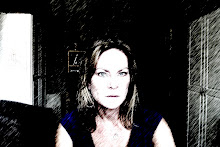Back in January I was fortunate enough to attend a two day workshop with an internationally renowned speech therapist in the field of autism, Michelle Garcia Winner.
My first impression was that she is an extremely astute businesswoman. She is constantly traveling to conferences and other speaking engagements around the globe. She has grown her clinical practice to the point where she can travel much of the time. She has also created her own publishing company to print and distribute her many training materials.
Garcia Winner has been working with individuals on the autism spectrum for over twenty years, but her focus has changed. She started out, like many professionals, working with those on the spectrum who are more challenged. Her practice now focuses on children and adults who have an Asperger's diagnosis. She is also working hard to refine the diagnostic categories of autism, as well as create sub-categories and more accurate prognoses--efforts that are greatly appreciated in the autism community.
The first day of the conference was not extremely helpful for me. It focused on teaching social skills to students/clients on the Asperger's portion of the spectrum.
The second day was more helpful to me specifically in regards to Liam, but also emotionally problematic. Garcia Winner went into more detail about her diagnostic categories and prognoses for those categories. If I'm right, Liam falls into her "moderate" or middle category and the most we can expect for him is to live a life of "guided independence". She specifically stated that individuals in this category could never succesfully attain the level of a university education, due to their inability to grasp the concept of inference--the ability to make predictions about events and characters that are not spelled out in the text.
This bothered me on a personal level, as it set limits for my son that I wasn't yet willing to accept. What bothered me as well was her tendency to occasionally poke fun at the clients she treats. It was all good-natured, but my friend Lisa and I agreed that there was something pitying and disparaging in her manner that was neither necessary nor appropriate when she showed video interviews of a pair of twins whom she had treated for ten years. Did these boys have impeccable social skills? No. Did they fit into society's standards of what people "should" act like? No, but they are fairly independent, articulate, self-aware and, most importantly, happy members of society. I would be thrilled if Liam were doing that well in his 20s.
Garcia Winner also, in my opinion, places a huge burden on the shoulders of her clients to change their fundamental natures. She took great pains to describe how grueling and time-intensive her process is and that the gains made are often minimal. In comparing her philosophies to those we learned at the Autism Institute last summer, I had to wonder why all of the responsibility to change falls on those with the disability. Why can't the rest of society learn to accept and embrace those who don't fit the typical paradigm of social behavior? Can the rest of us just get over it if not everyone pretends to be interested in our babies, cats and weekend plans?
One of Garcia Winner's helpful lessons showed how to use movies to teach what she calls "social thinking". She showed a clip from a film and explained how you can use the characters and situations to analyze motivation and make predictions--getting back to the idea of inference. This can be a way of practicing guessing what other people are thinking, since they don't usually tell us directly.
As depressed as I was about Garcia Winner's prognoses for Liam's place on the spectrum, when I showed him a movie that night, I put her suggestions into practice. I was very pleasantly surprised by how well he did. I showed him Enchanted, which I thought was a good film to use, since the characters are so purely crafted for good or evil purposes. He was, for the most part, able to tell me when someone was telling the truth or lying (a very important social skill) and what reason someone might have for lying.
What was even more encouraging: the following week his teacher mentioned to me how impressed she was with his reading comprehension and, specifically, his ability to infer. I was so surprised to hear that that I made sure we were talking about the same thing. I mentioned the workshop and what Garcia Winner had said about people on that part of the spectrum not ever being able to master inference. His teacher said, yes, that's what it was and she had never taught a child on the spectrum who was able to do it.
I mean no disrespect to Ms. Garcia Winner and I'm sure, based on her comments about "well-meaning" (code for "deluded") parents that she would see me as unrealistic, but I choose to see this as yet one more example of how little the experts really know for sure about autism and how very little they know about my son.
Monday, March 23, 2009
Subscribe to:
Post Comments (Atom)

No comments:
Post a Comment